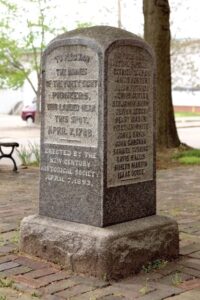Give us today our daily bread
Smart people are interested in prayer. Seventy-six percent of Americans claim that they pray, and 50% report that they pray daily, according to minister Bob Russell in his book When God Answers Prayer. During the COVID epidemic, online searches for “prayer” were at the highest level ever in over 90 countries in the world and the number one request that people make of spiritual leaders is “teach me to pray more effectively.” Apparently, most people pray, but we don’t think we’re good at it.
Maybe you’re better than you think!
In His Model Prayer, Jesus taught his disciples to pray “Give us today our daily bread” (Matthew 6:11, NIV). That one phrase should take much of the uncertainty out of prayer because Jesus teaches us to pray about breakfast! If we can pray about a basic need of life, like food, then nothing is off of the table (pardon the pun). We can take all of our thoughts and needs to God and know that He is a Heavenly Father who loves his children and will respond accordingly. With that one line from the Model Prayer, Jesus invites us to center our entire lives on God and to trust His provision, even for the “little” things. If prayer helps you focus on God’s provision and love and seek His will for your life, you’re already praying effectively.
So don’t quit.
A study done by University of Miami researchers Gail Ironson and Salmon Shaheem Ahmad and reported in the Journal of Religion and Health (2023) showed “that a greater frequency of private prayer predicts survival.” After correcting for medical and demographic variables, Ironson and Ahmad concluded that “people with a chronic illness who prayed daily or more were 1.5 to 1.7 times more likely to survive (depending on covariates) over 6 years than those who prayed less often.” Simply stated, prayer can improve both the quality and length of your life, so keep praying, because God is listening. If you’re talking and God is listening, that’s an effective prayer!
That doesn’t mean, of course, that you will receive everything you ask for. God is our Heavenly Father and sometimes responds the way a good earthly father would. For example, a child might ask for 2 servings of dessert and say “Let’s just skip the eggplant, please.” But a good earthly father would respond, “Eat your vegetables first and then we’ll talk about 1 dessert.” In Matthew 7:11, Jesus said, “If you, then, though you are evil, know how to give good gifts to your children, how much more will your Father in heaven give good gifts to those who ask him!” God will provide for our needs (not our greed!) and He will do what is good for us, not what isn’t. Sometimes that might mean that God will give us strength to bear up under difficult times rather than making the bad times better – or sometimes He may choose to end those bad times.
Shelton Cole illustrates this principle with the story of a Scout named Gilbert who was competing in his troop’s Pinewood Derby. Gilbert’s mom was a single parent who helped him with the car as much as she could, but on race day, there were glaring differences between Gilbert’s car and those of racers whose fathers had helped. Somehow, however, Gilbert’s wobbly car finished first in each heat of the race and it came down to the final between Gilbert’s car and Tommy’s car – the prettiest, sleekest car there that afternoon. Before the race, Gilbert asked for a moment to pray. After a long minute and half, Gilbert announced that he was ready and both cars rolled down the track, with Gilbert’s edging out Tommy’s for first place. After the race, the Scoutmaster asked Gilbert, “So you prayed to win the race?” “Oh no, sir,” Gilbert replied, “that wouldn’t be fair to ask God to help you beat someone else. I just asked Him to make it so I don’t cry when I lose.”
One more truth from that line of the Model Prayer deserves notice: Jesus said, “Give US today our daily bread” (emphasis mine). Jesus’ prayer recognizes that one can’t truly be content if others don’t have enough; everyone needs to eat! Those who have more than enough must share with the one who has too little so that everyone is satisfied. The early church practiced that principle and “there were no needy persons among them” (Acts 4:34).
Mark Wilmoth is with Pinehurst Christian Church in Marietta. For more information about Pinehurst Christian Church, visit www.PinehurstChristianChurch.org.



